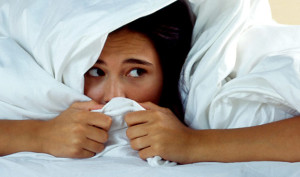Phobia
 A phobia as an intense, irrational fear. To be phobic of something is to be inproportiantely afraid of it. For example, if a person has a phobia of snakes, they will respond in terror to any snake, even if it is harmless. Phobias can develop in children and adults, but more commonly in children.
A phobia as an intense, irrational fear. To be phobic of something is to be inproportiantely afraid of it. For example, if a person has a phobia of snakes, they will respond in terror to any snake, even if it is harmless. Phobias can develop in children and adults, but more commonly in children.
Several common symptoms of a phobic reaction are feeling unable to control your fear, perspiration, a fear of going insane or losing control, upset stomach, feeling detached from yourself, shaking or trembling, intense feelings of panic and anxiety, a racing heart, feeling like you might faint or die, flashes of heat or cold, the sensation of tingling, lightheadedness, constricted breathing, wanting to escape and tightness in the chest.
Some phobias are so common that they are universal. For example, fears of death, sickness, flying, needles, enclosed spaces, snakes, germs, bacterias, speaking in front of crowds, storms, heights and spiders are phobias that many of us are familiar with.
If a person realizes that their phobia is interfering with their life, they should seek treatment for it. Many people who take self-help seriously have worked themselves through phobias and come out on top. For those with more debilitating phobias, professional therapy and medication is available.